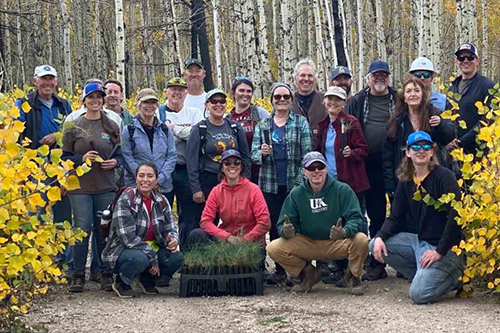 Colorado’s Poudre Valley Rural Electric Association is helping re-create forests and watersheds damaged by the worst wildfire in the state’s history.
Colorado’s Poudre Valley Rural Electric Association is helping re-create forests and watersheds damaged by the worst wildfire in the state’s history.
The Fort Collins-based distribution co-op donated $50,000 on behalf of its members and invited them to join staff volunteers in a massive tree planting project that could benefit the area for hundreds of years.
“This was a great opportunity for us to involve our members in a vital community project,” said Sam Taggart, PVREA’s strategic communications director. “The results are expected to help our area recover and provide lasting benefits that will help preserve the environment for generations to come.”
The Cameron Peak Fire started small with smoke and flames first seen near Colorado’s Cameron Pass on Aug. 13, 2020. Over the next 15 weeks, those flames consumed nearly 209,000 acres of brushland and forests along the eastern face of the Rocky Mountains.
“Some of that damage occurred in and around our 2,000-square-mile service territory, but for four months all of our members were constantly reminded of the fire threat and its effects are still visible to us every day,” said Taggart. “It had a huge, lasting impact on our members and our communities.”
The co-op wanted to make a meaningful contribution to the recovery, so they partnered with a local nonprofit, the Coalition for the Poudre River Watershed, which works with local, state and federal agencies, environmental groups and other community organizations on post-fire restoration projects to improve and maintain the ecological health of the watershed.
“Major fires have lasting impacts over several years, even up to a decade or more,” said Daniel Bowker, the CPRW’s forest and fire project manager. “We’re still seeing areas that are eroding. We’ve tried to put a lot of mulch on those areas from the helicopters…to slow down some of that sediment and ash as it comes downhill and down the stream systems.”
Replanted trees will not only help slow erosion, but they will also help restore the soil’s ability to filter out nutrients that could contaminate the Poudre River. That watershed supports the water supply for over 300,000 people living in the Front Range and attracts millions of dollars in annual economic activity for the whitewater and recreational fishing industries.
“The fire has not only affected drainage patterns and worsened seasonal flooding in some areas, but soot and burn debris washes into rivers and creeks during the spring snowmelt and whenever heavy rains occur,” said Taggart. “Many of the mountain communities we serve are dealing with those issues regularly, more than two years after the fire was fully controlled.”
Overall fire damage was estimated at $135 million, with nearly 470 buildings destroyed, including 224 homes. While blue spruce, lodgepole pines and other native plants are being reestablished naturally in some areas, Ponderosa pine stands have been slow to recover.
The trees take 300 to 400 years to mature, and natural reseeding rarely occurs more than 200 feet from an existing healthy tree. Recent research has shown these types of tree species are not coming back organically in lower elevations after severe fires.
With enough volunteers, CPRW can plant about 500 seedlings a day. So, the co-op reached out to staff volunteers and its members to organize three days of tree planting that began last September. Around 1,500 trees were planted on 25 acres by 35 PVREA members and their families along with PVREA and CPRW staff.
Sites were identified where the tiny seedlings would have the best likelihood of survival. While each green sprig of tender needles took just minutes to plant, they could grow 12 to 24 feet per year, eventually producing stands of Ponderosa Pine towering 200 to 300 feet over reforested mountainsides.
“By providing economic support along with the boots on the ground to back it up, our co-op is all in for the restoration of our watershed here in northern Colorado,” said PVREA President and CEO Jeff Wadsworth.
Restoring the Poudre River Watershed will continue to be a community-wide effort, said Wadsworth. “We’re really rooted in the communities we serve, so this project and the collaboration we’ve shared with CPRW, our staff and members are great opportunities for us to showcase our cooperative difference.”


